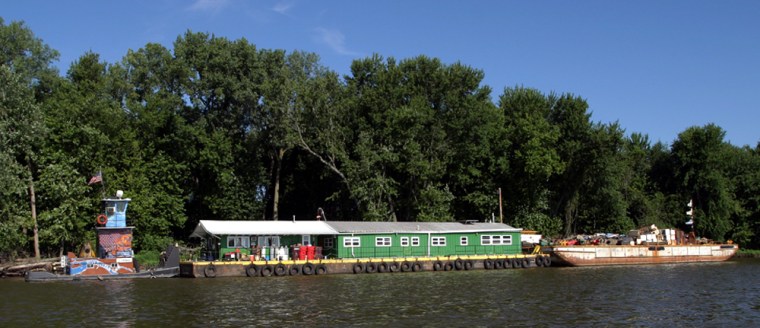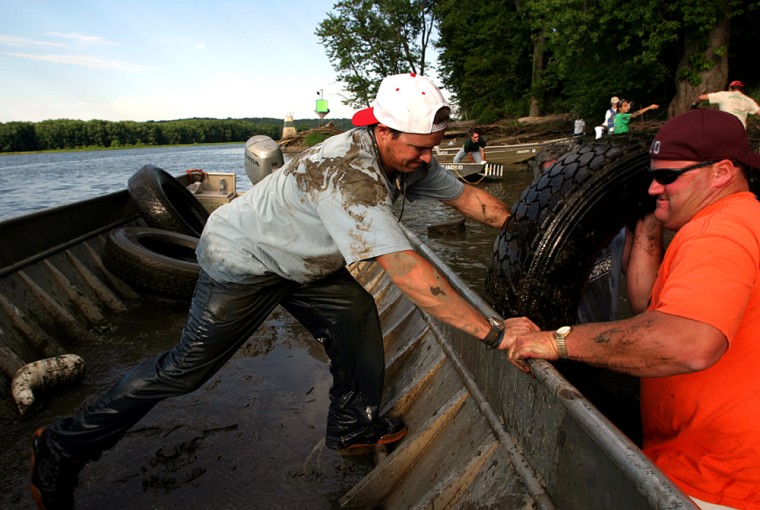Inspiration sometimes springs from the strangest places, and in Chad Pregracke’s case it leaped out of a garbage-strewn stretch of the banks of the Mississippi River and grabbed him. On Day 5 of our trip down the length of the river we found the same thing in his willingness to tackle a problem that no government agency would touch.
The problem is riverside junk – mired in the muck and often all but inaccessible in the river’s shallow backwaters -- and the 29-year-old Pregracke (pronounced preh-GRAK-ee) has happily taken on what some might consider an impossible job as the river’s garbage man.
In fact, despite odds that would make a riverboat gambler blanch, he is making headway against the relentless tide of refuse.
“I think we’ve definitely made a difference and a dent in the amount of garbage out here,” he said. “But more so, it’s like people are seeing the river as a treasure and not throwing stuff into it.”

These days, his multicolored towboat and four barges – three laden with piles of garbage reclaimed from the river and the fourth floating the living quarters for Pregracke and his crew – are a common sight on the river, steaming back and forth between St. Louis and the upper Mississippi to conduct cleanups, support shoreline tree-planting outings or host educational workshops.
At the same time, he has grown his one-man operation into Living Lands & Waters, an organized strike force with a $600,000 annual budget and well-heeled corporate sponsors like Alcoa, Anheuser-Busch, Cargill and numerous barge companies. By his calculations, the cleanups have now removed more than 2 million pounds of trash from the river.
A Mississippi motivator
Pregracke’s successes have made him a hero to many river folk, including those we encountered in Sabula, Iowa, population 670, which was the site of a Living Lands & Waters cleanup this week.
“He shows as much enthusiasm for this as he does a big city cleanup where he’ll get all sorts of publicity,” said Mark Beck, who runs the waste transfer station in Sabula and who first approached Pregracke about doing a cleanup there. “He is Mister Mississippi River as far as I’m concerned.”
Pregracke’s greatest asset is his ability to put people at ease with a blend of evangelical fervor and near-pathological pranksterism. He is particularly fond of making outrageous statements with a straight face, and then bursting out with a “Just joking!” when the listener bites on a particular whopper. “Aw, we love it don’t we!” is a frequently heard kicker.
Kim Erndt, who joined Pregracke’s crew in February after completing her graduate studies in biology and aquatic toxicology at Central Missouri State, said she is in awe of Pregracke’s ability to motivate people.
“He’s smart and he could be doing anything, but here he is picking up garbage,” she said. “He has the energy and charisma and skills to bring people together like no one I’ve ever met.”
Pregracke, who grew up in a river-loving family in East Moline, Ill., embarked on his quixotic quest in 1997, when he became disgusted by the amount of garbage piled up on some of the river islands near his fishing and shell-diving grounds in the Quad Cities area.
“I was just sick of seeing it all and I said, ‘I’m going to do something about it,’” he recalled.
He first tried to interest state and local officials in the problem, but got nowhere with his letter-writing and phone-calling efforts.
He then targeted the three biggest companies in the Quad Cities area – Alcoa, John Deere and Case-IH – preparing a photo montage showing sites littered with empty chemical barrels, appliances, box-spring mattress skeletons and tires, lots of tires. He got a foot in the door at Alcoa and persuaded the company to invest $8,400 in his scheme to attack the huge backlog of garbage. He then went out in his 20-foot flat-bottom boat, a remnant of his brief flirtation with a career as a commercial fisherman, enlisted a few friends and went to work.
The early cleanups succeeded in removing junk from the river, but more important generated headlines and TV coverage about the idealistic enterprise. That built the momentum that enabled Pregracke to build the non-profit Living Lands & Waters to the point where it now has a paid staff of 10 and more than 50 sponsors, including 10 major corporations.
It also earned him a presidential Jefferson Award for public service, which he received from first lady Laura Bush in June 2002. The other recipients were Rudolph Giuliani, Bill and Melinda Gates and Lilly Tartikoff, an anti-cancer activist and wife of former NBC executive Brandon Tartikoff.
In addition to his ability to attract corporate sponsorship, Pregracke has an uncanny ability to fire up his ever expanding army of volunteers along the river.
We saw his chops in Sabula, as he exhorted the 40-50 locals who showed up to help clean two sites near to town to observe safety rules, work hard and have fun.
Mud, muscle and tons of junk
After traveling to the first site in a small armada of open boats, the volunteers leaped out onto the shore of nearby Keller Island and immediately fell into dismantling what appeared to be an old breakwater made of tires dropped over rebar anchored in the mud and the remnants of an old cabin.
This wasn’t a job for the squeamish, as it required wading knee-deep into the mud and water and wrestling with objects firmly in the river bottom’s clutches after decades in the goo. That was no deterrence to the volunteers, who waded in and did battle with the debris, kicking up waves of mud that soon had them looking like losers in a pig-wrestling contest.
A beaming Stevie Sheedy, 13, took a brief moment to facetiously complain to her mom that her shoes were getting muddy.
“Your shoes? Look at your face,” replied a nearby man in a life-or-death wrestling match with a tire.
After 45 minutes, the enemy was defeated and three of the open boats were piled high with debris.
On the ride back to Pegracke’s barge, 12-year-old Kyle Johnson made a muscle and said the cleanup had been too much fun. “I love just being in the mud and stuff and helping the river,” he said.
After unloading the three boatloads of junk, and cleaning a nearby site where a runaway houseboat had been bashed to pieces on the rocks, Pregracke estimated that the three-hour operation had removed between 7 and 8 tons of junk from the river.
While Pregracke’s contributions to the Mississippi’s beauty are considerable, his biggest long-term contribution to the river may be that he has been able to bridge the often wide divide between the environmental community and the river’s commercial interests. Both sides have the utmost respect for his work and praise him as a straight-shooter.
Pregracke said he goes to considerable lengths to preserve his status as a consensus-builder, staying out of the greater debates over river health, such as the lock-and-dam expansion plan currently before Congress.
“I’m not against anybody, I want to work with them,” he said. “I like it when people who have never worked together are out there picking up garbage side-by-side.”
After Pregracke dropped us off at the dock in Sabula, we piled into our van and resumed our southward journey with a drive through the Quad Cities to the picturesque town of Burlington, Iowa, home of nation’s crookedest street contender Snake Alley.
On Day 6 of our trip, we’re getting back on the road and heading for the land of Twain – Hannibal, Mo.
Reporter and media producer Jim Seida are traveling the length of the Mississippi in August and will be filing daily dispatches along the way. If you have a question or comment, mail us at mississippi@msnbc.com.
